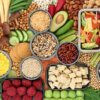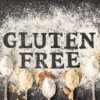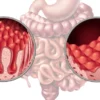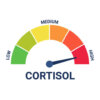
What is Ulcerative Colitis?
Ulcerative colitis (UC) is a form of inflammatory bowel disease (IBD) of the colon (large intestine). The severity of the inflammation of the gut lining can vary between individuals with the digestive condition. This can also relate to the severity of the symptoms being experienced in Ulcerative colitis.
The main symptoms of Ulcerative colitis include bloody diarrhoea, abdominal pain as well as increased urgency for a bowel movement. In addition to this, those with Ulcerative colitis can also experience a gut symptom known as tenesmus. This is where there can be the ongoing sensation to pass a stool however, the bowel is empty. [Source: PubMed]
What causes Ulcerative Colitis?
While a single cause of Ulcerative colitis has not been identified, there are several risk factors that are understood to increase the likelihood of this gut condition developing.
These factors include:
- Age and Gender
- Race and Ethnicity
- Genetics
- Smoking
- Diet
- Microbiota (the gut microbiome)
- Appendectomy [Source: PubMed]
Age and Gender:
The risk of developing Ulcerative colitis appears to peak at 2 age points. This can be in the second-third decade of life with a second peak in the risk between 50-80 years of age. Some research has indicated an increase in the presence of this condition in the male population, however, this is not found in all studies. [Source: PubMed]
Race and Ethnicity:
When compacted to non-Jewish populations, those of Jewish heritage have a 3 time-increased risk of Ulcerative colitis. [Source: PubMed]
Genetics:
Studies have found that 8-14% of patients with Ulcerative colitis also have a family member with inflammatory bowel disease. Alongside this, certain studies have found alterations in specific genes increase the risk of developing this gut condition.
Smoking:
It has been well documented that smoking can decrease the risk of developing Ulcerative colitis. It has also been found that if Ulcerative colitis develops in those currently smoking, the severity of the condition is likely to be lower, and there is a reduced need for immunosuppression medication and surgery. The protective effects of smoking may be due to nicotine suppressing the immune response in the gut and therefore reducing inflammation. [Source: PubMed]
Diet:
One factor that can contribute to the development of Ulcerative Colitis is due to an immunological (immune) reaction to certain foods. Part of this involves the association of a highly processed diet (often referred to as the Western Diet) to impact the gut microbiome and the gut barrier. The higher intake of processed meats and refined carbohydrates, alongside reduced fibre intake, can disrupt the gut microbiome, increasing the risk of inflammation. [Source: PubMed]
Microbiota: (the gut microbiome)
Imbalances in the gut microbiome are referred to as dysbiosis. In this situation, we can see increased levels of potentially pathogenic (bad) organisms and reduced levels of beneficial and health-promoting organisms. This can lead to increased levels of organisms that contribute to inflammation and fewer numbers that can regulate inflammation and the immune response within the gut. These factors can also influence the immune response in the large intestine.
Appendectomy – In Ulcerative colitis, the removal of the appendix decreased the risk of developing this form of inflammatory bowel disease. In those who had their appendix removed before the age of 20, a 55% reduction in developing Ulcerative colitis has been reported. [Source: PubMed]
Also Read: How Is Ulcerative Colitis Diagnosed
 What are the best foods for Ulcerative colitis?
What are the best foods for Ulcerative colitis?
The food to eat and the dietary approach to be considered for Ulcerative colitis can vary on factors such as the stage of the disease and whether or not a patient is in an active flare-up.
Taking this into consideration, different recommendations can be made for the diet depending on the individual and their current state of relapse or remission. While there can be certain foods to avoid that might trigger symptoms, the dietary approach and the severity of food restrictions can vary between Ulcerative colitis patients.
A general template for Ulcerative colitis and inflammatory bowel diseases that has been researched is the IBD-AID (Inflammatory bowel disease – anti-inflammatory diet).
This is divided into 3 stages that can be implemented depending on disease activity.
Phase 1
- Soft foods, pureed foods, no seeds
- Why should I be following this phase? – Currently experiencing a flare, any bleeding, urgency and high frequency of bowel movements or pain. This phase is helpful for patients who have recently been hospitalized. At this stage, you may not be able to tolerate many foods, in part due to the texture of the food. This phase emphasizes soft and pureed foods using a blender. Tolerance of foods is individualized.
- Examples of foods – Smoothies, well-cooked whole (groats) or steel-cut oats, ground flax or chia seeds (if you can tolerate ground seeds) pureed soups, pureed vegetables, yoghurt and miso (good sources of probiotics), and ground lean meats.
Phase 2
- Soft textures, well-cooked, no seeds. May still need to avoid stems, choose floppy greens or other greens depending on individual tolerance.
- Why should I be following this phase? – Symptoms have improved significantly but are not completely alleviated. You may be able to tolerate some fibre but might still have trouble digesting foods high in fibre and fat. More fibrous foods are added in this phase, in the form of soft-cooked vegetables and pureed beans/lentils. It is suggested to drink plenty of water and increase probiotic foods (e.g., plain yoghurt, aged cheese, fermented veggies, kefir, miso, microalgae, pickles, honey, raw honey, fermented cabbage), when adding fibre to the diet.
- Examples of foods – Soft greens (butter lettuce, cooked collard greens, baby spinach without stems), well-cooked lean meats, aged cheeses (Cheddar, Gruyere, Manchego, Gouda and Parmesan-types like Parmigiano-Reggiano and Grana Padano), nut butter, tomatoes, pureed berries with seeds strained out, and foods baked with IBD-AID friendly flours (bean flours, nut flours).
Phase 3
- If in remission with no strictures, can gradually go back to normal food preparation. Can gradually increase intact fibre intake.
- Why should I be following this phase? – Your symptoms are gone. You are feeling stronger and are becoming more comfortable eating a greater variety of foods. Your bowel movements are well-controlled and solid.
- Examples of foods – Stir-fried vegetables, cruciferous veg like cabbage, cauliflower, broccoli, meats, citrus fruits, whole beans, and whole nuts.
Additionally, specific foods have been associated with improving Ulcerative colitis. [Source: PubMed]
Is Yoghurt good for Ulcerative colitis?
Several studies have assessed the benefits of yoghurt in inflammatory bowel diseases such as Ulcerative colitis. In one study, after 30 days of supplementation of yoghurt containing 2 strains of probiotic bacteria (L. reuteri and L. rhamnosus) certain immune markers improved. This indicated a better immune response and reduced inflammation. [Source: PubMed]
A second study using 250g of yoghurt per day which contained Bifidobacterium and Lactobacillus strains was also conducted. This resulted in increased levels of these organisms in stool cultures which was associated with reduced levels of inflammation in the bowel. [Source: PubMed]
Is oat bran good for Ulcerative colitis?
Oat bran is the outer layer of oats which has been studied for gut health in Ulcerative colitis. Studies have reported that 60 grams per day of oat bran when given to those with Ulcerative colitis led to a reduction in symptoms of IBD.
This may be due to oat bran increasing the concentration of butyric acid within the colon. This is relevant as butyric acid (produced via microbial fermentation of oat bran) has anti-inflammatory benefits for the gut lining. [Source: PubMed]
Are fish oils and omega-3 fats good for Ulcerative colitis?
The consumption of omega-3 fats has been associated with anti-inflammatory benefits that can support the healing of the gut lining and reduce the symptoms of active inflammatory bowel disease including Ulcerative colitis.
This can be achieved with regular dietary inclusion of oily fish or via supplementation of fish oils. The oily fish with the highest concentration of omega-3 oils are salmon, mackerel and sardine. [Source: PubMed]
This was reflected in a study that found including 600g of salmon per week led to a reduction in inflammation in those with mild Ulcerative colitis. [Source: PubMed]
Fish oil supplementation has also been found to lead to a reduction in inflammation in Ulcerative colitis. This was reported in a recent study using 1 gram of fish oils per day in capsule form. [Source: PubMed]
Is gluten bad for Ulcerative colitis?
Gluten is a protein found in wheat as well as in rye and barley. Studies have reported that following a gluten-free diet can lead to an improvement in IBD symptoms. [Source: PubMed]
A 2014 study examining the role of a gluten-free diet in Ulcerative colitis concluded that nearly 70% of those following a gluten-free diet reported improved symptoms. [Source: PubMed]
Does the low FODMAP diet work for Ulcerative colitis?
The low FODMAP diet has been researched more extensively for IBS (irritable bowel syndrome). However, studies have also been carried out into its benefits of IBD.
The low FODMAP diet limits certain fibres found in a range of fruits, vegetables and grains due to how they are absorbed or fermented. Due to inflammation or imbalances in the gut, these processes may be impacted which can lead to mal-fermentation, resulting in digestive symptoms.
During a 6-week trial of the low FODMAP diet in IBD patients, 78% of the participants reported a significant improvement in their digestive symptoms. These symptoms included:
- Abdominal pain
- Heartburn
- Flatulence
- Bloating
- Belching
- Incomplete bowel movements
- Nausea [Source: PubMed]
Additionally, a 2017 study found that those with IBD have an increased sensitivity to the fructan category of FODMAPs. These foods include; onion, leeks, asparagus, cabbage, prunes, watermelon and ripe bananas.
While this may not be the case for all of those with this condition, it can be an important consideration when considering dietary approaches.[Source: PubMed]
How can I stop Ulcerative colitis?
Along with diet, natural supplements and lifestyle adjustments can also be considered. This is with the aim of bringing this gut condition into remission and preventing a relapse.
Working with a registered practitioner can support this process and create a personalised protocol for you to follow.

 What are the best foods for Ulcerative colitis?
What are the best foods for Ulcerative colitis?




